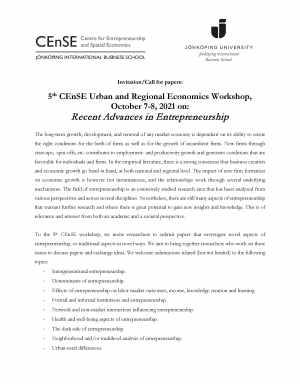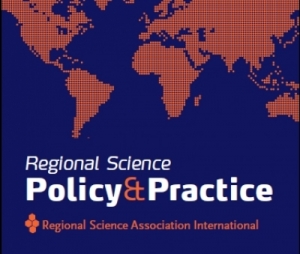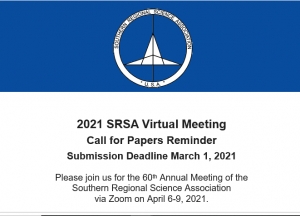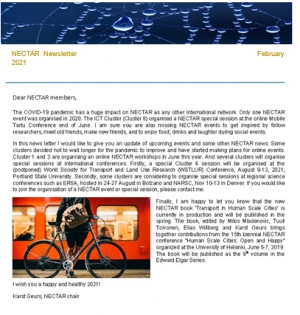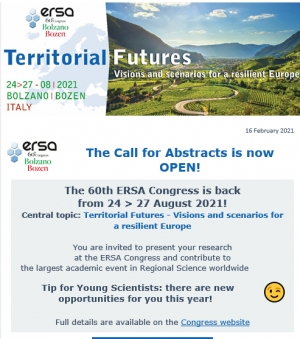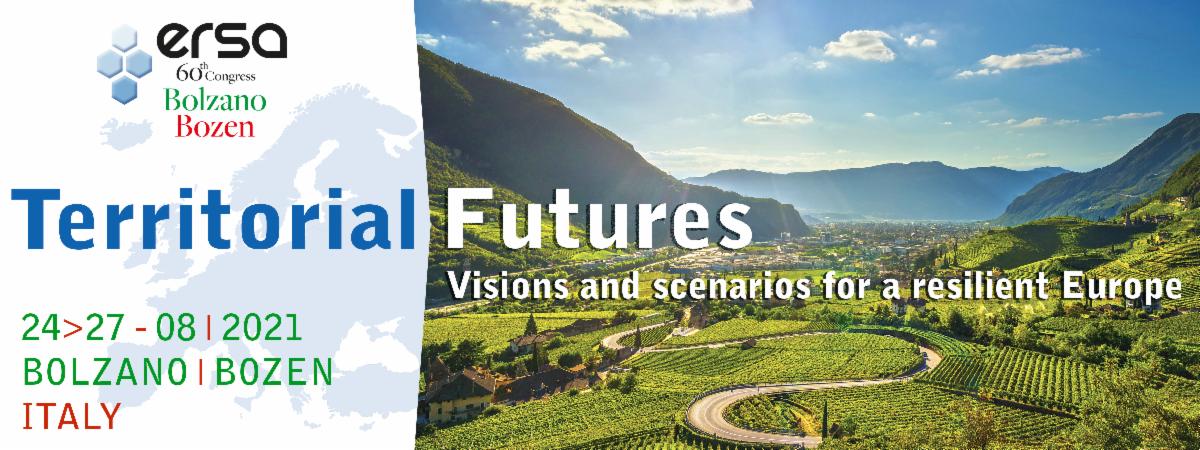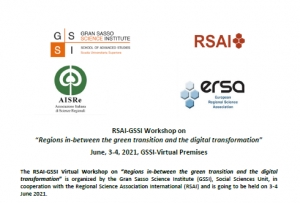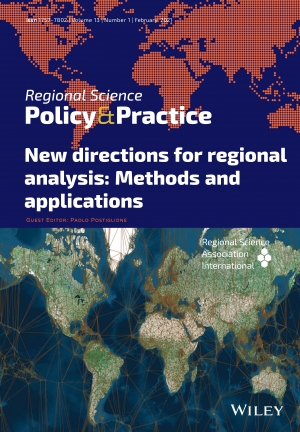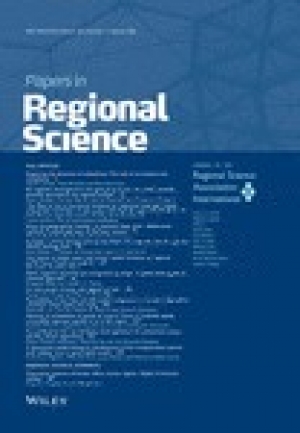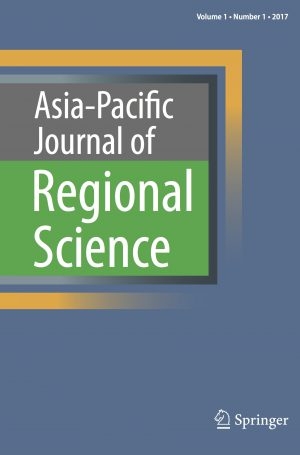Council
Elisabete Martins
Call for papers: 5th CEnSE Urban and Regional Economics Workshop, October 2021, Sweden
Invitation/Call for papers:
5th CEnSE Urban and Regional Economics Workshop,
October 7-8, 2021 on:
Recent Advances in Entrepreneurship
The long-term growth, development, and renewal of any market economy is dependent on its ability to create the right conditions for the birth of firms as well as for the growth of incumbent firms. New firms through start-ups, spin-offs, etc. contributes to employment- and productivity growth and generates conditions that are favorable for individuals and firms. In the empirical literature, there is a strong consensus that business creation and economic growth go hand in hand, at both national and regional level. The impact of new firm formation on economic growth is however not instantaneous, and the relationships work through several underlying mechanisms. The field of entrepreneurship is an extensively studied research area that has been analyzed from various perspectives and across several disciplines. Nevertheless, there are still many aspects of entrepreneurship that warrant further research and where there is great potential to gain new insights and knowledge. This is of relevance and interest from both an academic and a societal perspective.
To the 5th CEnSE workshop, we invite researchers to submit papers that investigate novel aspects of entrepreneurship, or traditional aspects in novel ways. We aim to bring together researchers who work on these issues to discuss papers and exchange ideas. We welcome submissions related (but not limited) to the following topics:
- Intergenerational entrepreneurship.
- Determinants of entrepreneurship.
- Effects of entrepreneurship on labor market outcomes, income, knowledge creation and learning.
- Formal and informal institutions and entrepreneurship.
- Network and non-market interactions influencing entrepreneurship.
- Health and well-being aspects of entrepreneurship.
- The dark side of entrepreneurship.
- Neighborhood and/or multilevel analysis of entrepreneurship.
- Urban-rural differences.
- Cross-country analyses.
You are welcome to suggest additional topics that you think would be suitable for this workshop. We welcome both theoretical and empirical contributions.
WHEN? The workshop will take place October 7-8, 2021.
VENUE? The conference, dinner, and accommodation will take place at Hällsnäs Hotel and Conference (http://hallsnas.bookvisitweb.com/en), which is located in a scenic rural setting conveniently close to Landvetter Airport, Gothenburg. Landvetter is Sweden’s second-largest airport with easy access to many international connections (https://www.swedavia.se/landvetter).
COST? The workshop attendance is free of charge, and accommodation and meals will be covered by the organizers. Travel costs, however, will have to be covered by the participants.
HOW? The workshop is organized by the research centre CEnSE (Centre for Entrepreneurship and Spatial Economics) at Jönköping International Business School (JIBS), Sweden. The workshop will have three keynote speakers and individual paper sessions. All papers will be assigned a discussant and all presenters/participants are expected to serve as discussants. We aim to encourage constructive discussions in an interactive setting and there will be no parallel sessions. Therefore, the size of the workshop will be limited. The organizers of the workshop aim to arrange an outlet in the form of a special issue in an international journal.
KEYNOTE SPEAKER I – Olav Sorenson is the Joseph Jacobs Chair in Entrepreneurial Studies, Professor of Strategy, and Faculty Research Director of the Price Center for Entrepreneurship & Innovation at the Anderson Graduate School of Management at UCLA. His primary stream of research pertains to economic geography, focusing on how entrepreneurship influences the growth and competitiveness of regions within countries and on why some regions appear more supportive to entrepreneurs than others. In 2018, he received the Global Award for Entrepreneurship Research.
KEYNOTE SPEAKER II – Karl Wennberg is a Professor in organization and entrepreneurship at Linköping University, Sweden. He is conducting interdisciplinary research at the intersection of Entrepreneurship, Organisational Sociology and Regional Science and has published more than 100 peer-reviewed articles, book chapters, books and reports. He is on the Editorial Boards of Academy of Management Journal, Journal of Business Venturing and Journal of Business Venturing Insights and senior editor of Entrepreneurship Theory & Practice.
KEYNOTE SPEAKER III – Pontus Braunerhjelm is a Professor in Economics at the Royal Institute of Technology and at the Blekinge Institute of Technology. He is also engaged at the research institute Swedish Entrepreneurship Forum as a research director. His research focus on entrepreneurship, innovation and SMEs and their contribution to industrial dynamics and economic growth. Pontus has published over 200 peer-reviewed articles and is an active and sought-after member in the public debate.
ABOUT CEnSE: CEnSE is a multi-disciplinary institute that performs applied research relating to issues of entrepreneurship and business renewal, regional development and growth, and the interrelation between urban and rural areas. A substantial part of CEnSE´s research addresses policy-relevant problems, for example how accessibility affects regional growth and the way entrepreneurial and innovative processes in business and society are dependent on knowledge and creativity. The project portfolio of CEnSE contains both research of general applicability and projects that are directed towards specific stakeholders. Visit https://ju.se/center/cense for more information about CEnSE.
You are encouraged to distribute this call to other interested researchers.
Organizers:
Mikaela Backman, This email address is being protected from spambots. You need JavaScript enabled to view it., co-director of CEnSE
Johan Klaesson, This email address is being protected from spambots. You need JavaScript enabled to view it., director of CEnSE
Sofia Wixe, This email address is being protected from spambots. You need JavaScript enabled to view it., co-director of CEnSE
Deadlines and information:
Abstract submission deadline: June 20, 2021.
Notification of acceptance: June 30, 2021.
(Draft) Paper submission deadline: October 1, 2021.
Please submit contributions to: This email address is being protected from spambots. You need JavaScript enabled to view it.
Winners RSPP Paper Award
Following the procedures to select the RSPP paper award, the jury constituted by Gordon Mulligan, David Plane , Philip McCann, Neil Reid and Tomaz Dentinho selected two articles as winners of the 2022 Best Paper award on RSPP. Congratulations to all winners!
The two papers are:
- Gabriel Lyrio de Oliveira and André Luis Squarize Chagas (2020) - Effects of a cash transfer programme on origin–destination migration flows. Regional Science Policy & Practice 12(1), 83–104.
Motivation:
Very thorough study using state-of-art regional science methodology to study effects of the Bolsa Familia programme in Brazil, showing an Interesting and pedagogical method to analyse the regional redistribution of income with very good data and important results for policy makers. Spatial and social redistribution of public money is an important topic and a good exemplar of a RSPP article.
- Kevin Credit (2020) - Neighbourhood inequity: Exploring the factors underlying racial and ethnic disparities in COVID- 19 testing and infection rates using ZIP code data in Chicago and New York. Regional Science Policy & Practice 12(6),1249-1271.
Motivation:
The paper focus a cutting-edge topic using a fine-grained neighbourhood modelling leading to interesting empirical findings s as well as specific and focused policy recommendations tied to the study results. It is a very relevant demonstration that it is possible and advisable to get scientific evidences from emergent phenomena that can be useful for policy makers.
Final Call for Papers: 60th Annual Meeting of the SRSA
|
|
|
|
|
|
NECTAR Newsletter Feb2021
NECTAR Newsletter February 2021
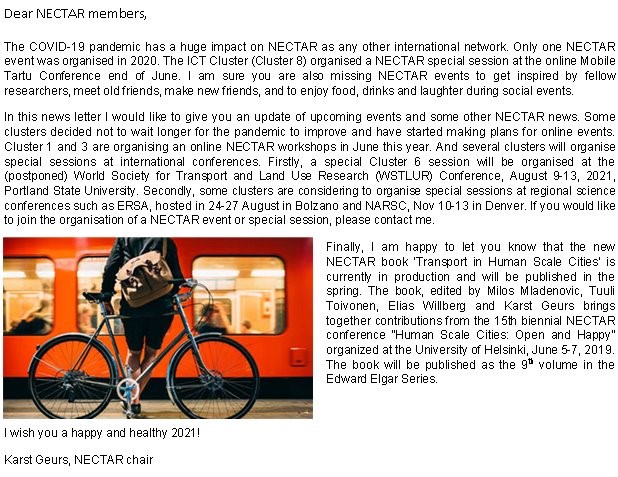
Upcoming events
Critical Discourses on Transport and Urban Development
Cluster 1 (Transport Infrastructure Impacts and Evaluation) is organising an online workshop on Critical Discourses on Transport and Urban Development on June 15, 2021. The workshop is hosted by cluster co-chair Robin Hickman from the University College London. The call for papers can be found here.
Intermodality and synchromodality in the European Modular System
Cluster 3 (Logistics and Freight) will organise an online workshop on “Intermodality and synchromodality in the European Modular System” on the 3rd and 4th of June 2021. The workshop is organized by University of Zaragoza. The call for papers can be found here.
Accessibility and Quality of Life
A Cluster 6 Special session “Accessibility and Quality of Life” at the World Society for Transport and Land Use Research (WSTLUR) Conference, August 9-13, 2021, Portland State University, United states. WSTLUR is planned as a hybrid conference - with in-person and remote engagement, with contingencies for a totally online conference if necessary. Submission deadline for full papers is March 15, 2021. For details please visit the WSTLUR conference webpage.
2021 NECTAR International Conference
The Biennial NECTAR conference in Toronto scheduled for 2021 will be postponed to July 20-22, 2022. The organization of the conference is in 2021 is too challenging given the uncertainty on the developments of the pandemic. The new date will allow NECTARists to combine the trip with participating in WCTR planned in Montreal for 24 - 28 July 2022. There’s a direct train from downtown Toronto to downtown Montreal.
Cluster 1 News
Niek Mouter new cluster co-chair for Cluster 1
Niek Mouter has joined Cluster 1 (Transport Infrastructure Impacts and Evaluation) as co-chair, replacing Moshe Givoni who sadly passed away at the end of 2019. Niek is Assistant Professor of Infrastructure Policy Appraisal at TU Delft’s Transport & Logistics group, with a background in economics (MSc) and philosophy of law (LLM). His research focuses on improving the appraisal of infrastructure projects and in my work he combines insights from various disciplines such as economics, philosophy, political science and urban planning. His current work addresses the inclusion of ethical considerations in appraisal models, such as the Cost-Benefit Analysis, and improving the usability of appraisal models for politicians, civil servants and other stakeholders. He (co) developed new appraisal approaches such as ‘willingness to allocate public budget experiments’ and ‘Participatory Value Evaluation’.
Award
Peter Nijkamp received the Roger R. Stough Outstanding Mentor Award
The Roger R. Stough Outstanding Mentor Award has been awarded to Peter Nijkamp, cluster 5 (Leisure, Recreation and Tourism) co-chair. The award recognizes regional scientists who have been exceptional mentors to students, junior faculty members and underrepresented populations and communities over a lifelong career. Peter received the award at the recent conference of the North American Regional Science Association (NARSC). Congratulations, Peter!
NECTAR agenda
June 3-4 2021, Cluster 3 online workshop on “Intermodality and synchromodality in the European Modular System”, University of Zaragoza, Spain
June 15, 2021, Online Cluster 1 workshop on Critical Discourses on Transport and Urban Development, UCL, London
August 9-13, 2021, Cluster 6 Special session “Accessibility and Quality of Life” at the World Society for Transport and Land Use Research (WSTLUR) Conference.
July 20-22, 2022, Biennial International NECTAR conference, University of Toronto, Canada
ERSA2021 Call for Abstracts (and) Papers in now OPEN!
|
Call for Applications | RSAI-GSSI Workshop on “Regions in-between the green transition and the digital transformation” June, 3-4, 2021, GSSI-Virtual Premises
RSAI-GSSI Workshop on
“Regions in-between the green transition and the digital transformation” June, 3-4, 2021, GSSI-Virtual Premises
The RSAI-GSSI Virtual Workshop on “Regions in-between the green transition and the digital transformation” is organized by the Gran Sasso Science Institute (GSSI), Social Sciences Unit, in cooperation with the Regional Science Association International (RSAI) and is going to be held on 3-4 June 2021.
The workshop aims at building bridges between emerging research on the green transition and the digital transformation at the regional level. It will provide academic training and stimulate debates about the extent to which the digital transformation can be harnessed by regions for the development of green technologies and the adoption of more environmentally sustainable models of development. The workshop will also address the implications that the intersection between the two transitions (green and digital), which may lead to contrasting implications in terms of social inclusion and justice, will have on the spreading of regional and interregional inequalities. The workshop will also focus on the impact that the socio-economic shock and recession brought about by the Covid-19 pandemic could have on the unfolding of the digital and the green transitions, and on whether it has been contributing to create an overlap or a mismatch between the respective trajectories of change.
The event is addressed and open to PhD students, post-docs and early-career researchers willing to meet and exchange ideas with scholars of different fields, in particular, but not only, between regional science and transition studies, innovation studies and environmental economics, economic geography and urban studies. Presenting completed research papers is advisable, but applicants could also submit for discussion early drafts or structured proposals of their research work.
The workshop is intended to be inherently multi-disciplinary as much as multi-focused on the wide set of regional domains in which the green and the digital transition can focus, including, among the others, those of the focal research tracks of the GSSI: “i) inner areas and peripheral development; ii) disasters and regional resilience; iii) human capital, migrations and local labour market; iv) cultural heritage, tourism and regional urban development; v) business, innovation and environmental sustainability within and across regions”.
Consistently with the spirit of the RSAI Building Bridges program, the workshop intends to facilitate connections between students and scholars of several parts of the world, counting on the crucial role that sharing heterogeneous experiences and backgrounds – in particular between core and peripheral areas - has for the success of the workshop. Students and researchers from low-income and lower- middle-income economies are particularly welcome and invited to apply.
How to apply
Applications should be sent by April 25, 2021 (12.00 CET) to the following email address: This email address is being protected from spambots. You need JavaScript enabled to view it.
Applications should include:
- A short CV of the
- A cover page with title and authors of the proposed paper or research
- A one-page abstract containing:
- A statement of research objectives.
- The positioning in the related literature.
- A brief illustration of the research method and of the expected
- A full paper, in case this is already
Applications will be evaluated by the Scientific Committee of the Workshop (see below), on the basis of the originality, the theoretical and empirical contribution, and the scientific rigor of the proposal. The Scientific Committee will select up to a maximum of 20 participants, among PhD students, post-docs and early-career researchers.
Program
Due to the Covid-19 pandemic restrictions the event will be held remotely through the Zoom platform, in a GSSI channel that will be timely communicated to the participants. The workshop will host two key- note speeches, by Professor Lars Coenen (The Mohn Center for Innovation and Regional Development, Western Norway University of Applied Sciences) and Professor Elisa Giuliani (Responsible Management Research Centre and University of Pisa, Italy). It will be articulated in a set of topical sessions, within which each participant will have 30 minutes available: 20 minutes for the presentation, and the remaining 10 minutes for discussion, questions and answers. An interactive round table with the members of the Scientific Committee will conclude the program.
Prize
At the end of the workshop, a prize amounting to 400 € will be awarded for the best paper/research proposal and presentation, to a participant researcher under 35 years old. The selection will be carried out by the Scientific Committee.
***
Scientific Committee: Roberta Capello (Polytechnic University of Milan and AISRE), Andrés Barge Gil (Universidad Complutense de Madrid), Andrea Caragliu (Polytechnic University of Milan and RSAI), Valentina De Marchi (University of Padua), Alessandra Faggian (GSSI), Claudia Ghisetti (Catholic University of Milan), Camilla Lenzi (Polytechnic University of Milan), Giovanni Marin (University of Urbino), Sandro Montresor (GSSI), Massimiliano Mazzanti (University of Ferrara), Francesco Quatraro (University of Turin), Mabel Sanchez Barrioluengo (University of Manchester), André Torre (University Paris-Saclay and ESRA), Elvira Uyarra (University of Manchester).
GSSI Organizing Committee: Andrea Ascani, Maria Giovanna Brandano, Fabiano Compagnucci, Alberto Marzucchi, Marco Modica, Sandro Montresor, Alessandro Palma, Ugo Rossi, Giulia Urso.
The 2021 call for grant applications (postdoctoral, starting and team grant) is opened in ETIS from 1 March to 17:00 (Estonian time) on 31 March 2021.
The 2021 call for grant applications (postdoctoral, starting and team grant) is opened in ETIS from 1 March to 17:00 (Estonian time) on 31 March 2021.
NB! The application is submitted only after the institution has confirmed it via ETIS. Please follow the deadlines of your institution.
Frequently asked questions about grant applications: call 2021
Guidelines for Completing Your Ethics Self-Assessment for Grant Application
The recommended form for the data management plan
Guidelines regarding bibliometric background information
Technology Readiness Levels (TRL)
TRL descriptions adapted for Social sciences, and Humanities and Arts
NB! The information webinar (in English) on call for grant applications takes place on 17 February from 14-16 (Estonian time) here.
Information in Estonian can be found here.
Contact
Siret Rutiku
Head of Department of Research Funding
Tel +372 731 7381
This email address is being protected from spambots. You need JavaScript enabled to view it.
More information: https://www.etag.ee/en/funding/research-funding/personal-research-funding/put-taotlusvoor-2021/
The latest issue of Regional Science Policy & Practice are available! Volume 13, Issue 1, Special Issue: New directions for regional analysis: Methods and applications, Pages: 1-205, February 2021
|
|
Regional Science Policy & Practice Volume 13, Issue 1
Special Issue: New directions for regional analysis: Methods and applications
1-205
February 2021
|
ISSUE INFORMATION
INTRODUCTION
ORIGINAL ARTICLES
The survival of new businesses in Andalusia (Spain): Impact of urbanization, education, and gender
- Pages: 25-41
Deprivation at local level: Practical problems and policy implications for the province of Milan
- Pages: 43-61
Spatial patterns in food waste at the local level. A preliminary analysis for Italian data
- Pages: 83-101
Territorial capital in local economic endogenous development
- Pages: 103-119
Can social support compensate for missing family support? An examination of dropout rates in Italy
- Pages: 121-139
Regional economic growth and inequality in Greece
- Pages: 141-158
The “meso” dimension of territorial capital: Evidence from Italy
- Pages: 159-175
Education as a key to reduce spatial inequalities and informality in Argentinean regional labour markets
- Pages: 177-189
Who gets what, where, and how much? Composite index of spatial inequality for small areas in Tehran
- Hamidreza Rabiei‐Dastjerdi
- Stephen A. Matthews
- Pages: 191-205
The latest issue of Papers in Regional Science is available! Volume 100, 1 (February 2021)
|
Papers in Regional Science Pages: 1-302 February 2021 |
ISSUE INFORMATION
![]() Free Access
Free Access
Pages: 1-2 | First Published: 02 February 2021
FULL ARTICLES
![]() Open Access
Open Access
Explaining the dynamics of relatedness: The role of co‐location and complexity
Sándor Juhász, Tom Broekel, Ron Boschma
Pages: 3-21 | First Published: 18 August 2020
Elena Calegari, Enrico Fabrizi, Gianni Guastella, Francesco Timpano
Pages: 23-50 | First Published: 17 August 2020
José Manuel López‐Fernández, Mariluz Maté‐Sánchez‐Val, Francisco Manuel Somohano‐Rodriguez
Pages: 51-77 | First Published: 18 August 2020
Marine Bernard, Bastien Bernela, Marie Ferru
Pages: 79-99 | First Published: 29 July 2020
European cultural heritage and tourism flows: The magnetic role of superstar World Heritage Sites
Elisa Panzera, Thomas de Graaff, Henri L.F. de Groot
Pages: 101-122 | First Published: 02 August 2020
The impact of health status and human capital formation on regional performance: Empirical evidence
Mercedes Gumbau Albert
Pages: 123-139 | First Published: 14 July 2020
Ethnic regional networks and immigrants' earnings: A spatial autoregressive network approach
Xingang Wang, Sholeh A. Maani
Pages: 141-168 | First Published: 02 July 2020
De facto power of elites and regional growth
Seung‐hun Chung, Mark D. Partridge
Pages: 169-202 | First Published: 22 June 2020
Zenoveva X. Correia, Antoni B. Moore, David P. Goodwin
Pages: 203-225 | First Published: 08 July 2020
Aurélie Mercier, Stéphanie Souche‐Le Corvec, Nicolas Ovtracht
Pages: 227-249 | First Published: 02 August 2020
Are preferences for city attributes heterogeneous? An assessment using a discrete choice experiment
Diana Romero‐Espinosa, Mauricio Sarrias, Ricardo Daziano
Pages: 251-272 | First Published: 03 August 2020
Francesca Pagliara, Massimo Aria, Lucia Russo, Valentina Della Corte
Pages: 273-285 | First Published: 19 August 2020
RESEARCH NOTES & COMMENTS
Alternative measure of border effects across regions: Ripley's K‐function method
Ying Ge, Yingxia Pu, Mengdi Sun
Pages: 287-302 | First Published: 02 August 2020
Special Issue of Asia-Pacific Journal of Regional Science on: The Science of Space
Special Issue of Asia-Pacific Journal of Regional Science on: The Science of Space
There is nowadays a rising interest in theoretical frameworks for regional science. The Asia-Pacific Journal of Regional Science (Springer-Nature) has just released a series of articles on this topic, in a special issue edited by Peter Nijkamp, Karima Kourtit and Soushi Suzuki (vol. 5. no.1, March 2021).
You are cordially invited to visit these contributions at: https://link.springer.com/journal/41685/online-first. Also access to: https://rdcu.be/cd1QG
About Us
The Regional Science Association International (RSAI), founded in 1954, is an international community of scholars interested in the regional impacts of national or global processes of economic and social change.

